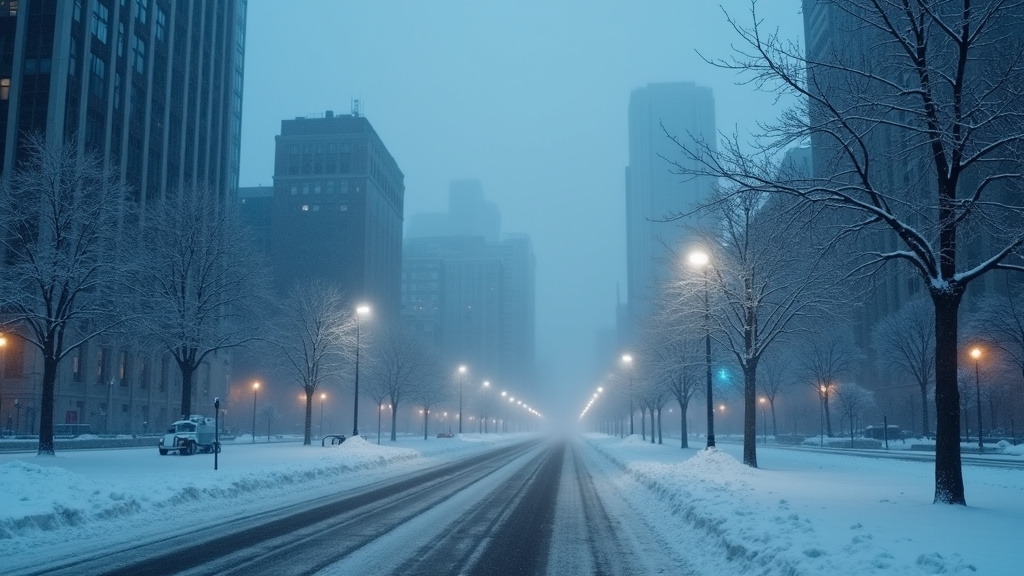In a dramatic display of federal power, approximately 300 agents descended upon a Chicago apartment complex, rappelling from Black Hawk helicopters in a sweeping immigration enforcement operation. The early Tuesday morning raid, concentrated in the city’s South Shore neighborhood, resulted in the arrest of at least 30 individuals believed to be undocumented immigrants. This significant law enforcement action is part of a broader, intensifying federal effort across the nation, dubbed “Operation Midway Blitz,” which has drawn both praise from administration officials and sharp criticism from community leaders and immigrant advocates.
A High-Stakes Operation Unfolds
The operation, carried out by U.S. Immigration and Customs Enforcement (ICE), the FBI, and U.S. Border Patrol, involved a formidable presence. Neighbors reported being awakened by loud noises and the presence of agents in military-style uniforms. Federal agents were observed rappelling from Black Hawk helicopters onto the rooftops of a five-story apartment building, an approach described as a “military-style raid”. While initial reports indicated around 30 arrests, some sources cite up to 37 individuals taken into custody. Department of Homeland Security (DHS) and FBI officials stated that the operation targeted suspected members of the Tren de Aragua, an infamous Venezuelan gang, along with individuals believed to be involved in drug trafficking, weapons crimes, and immigration violations. Local police were not involved in the raid.
Operation Midway Blitz and Federal Rationale
This operation is a component of “Operation Midway Blitz,” a federal initiative launched by the Trump administration specifically targeting “criminal illegal aliens” who have entered Chicago and Illinois, according to DHS. Officials have cited the city and state’s sanctuary laws, which limit cooperation between local law enforcement and federal immigration agents, as a reason for the increased federal presence and enforcement actions. DHS has claimed that the raid was conducted to honor Katie Abraham, a Chicago woman killed in a drunk driving hit-and-run crash earlier this year, with the driver identified as an undocumented immigrant from Guatemala. The administration has asserted that its enforcement actions are aimed at removing individuals with criminal records and those who have violated immigration laws.
Community Outcry and Official Condemnation
The tactics employed in the raid have sparked significant backlash. Community activists and local leaders have vociferously condemned the operation. Veronica Castro of the Illinois Coalition for Immigrant and Refugee Rights described the event as “absolutely disgusting” and harmful to immigrant families. State Senator Robert Peters called the actions “disgusting” and argued they do “nothing to make us safer”. Governor JB Pritzker has also been critical, stating that “none of what Trump is doing is making Illinois safer”. Residents described being startled by the helicopter activity and witnessing neighbors, including women and children, being detained. Critics pointed to accounts of “hundreds of masked agents knocking down doors and dragging families out in the middle of the night,” expressing concern over the aggressive enforcement in residential areas.
Escalating Tensions and Press Freedom Concerns
The Chicago area has been a focal point for intensified immigration enforcement, leading to increased tensions and protests. Federal agents have been observed patrolling downtown areas and making arrests near popular landmarks like Millennium Park. The increased activity has also led to clashes outside ICE facilities, particularly at the Broadview ICE processing center, where protests have become frequent.
A significant point of contention has been the treatment of journalists covering these events. In an incident reportedly occurring outside a detention facility in Broadview, CBS Chicago reporter Asal Rezaei stated she was “absolutely unprovoked”ly shot with a pepper ball by an ICE agent, with chemicals entering her vehicle through an open window. Other journalists have reported being detained or assaulted while documenting protests and arrests, with DHS officials defending agents’ actions by claiming media personnel “obstructed operations”. The use of force against reporters attempting to cover immigration enforcement has raised serious concerns about press freedom.
Legal and Civil Liberty Debates
The surge in federal immigration enforcement has amplified debates surrounding civil liberties and potential racial profiling. Reports indicate that federal agents have been seen conducting patrols and making arrests in predominantly Latino neighborhoods, fueling concerns among advocacy groups. A recent Supreme Court decision that temporarily halted an order preventing agents from using ethnicity as a factor in immigration enforcement has further heightened these worries, with advocates suggesting it could weaken constitutional rights. In response, community organizations are actively distributing “Know Your Rights” guides to inform residents of their legal protections.
Conclusion
The large-scale helicopter raid and subsequent arrests in Chicago’s South Shore neighborhood represent a significant escalation in federal immigration enforcement under “Operation Midway Blitz.” While DHS maintains the operation targets dangerous criminals, the methods, scale, and impact on immigrant communities and the broader public have ignited widespread debate. The incidents involving journalists and the concerns about civil liberties add further layers to this unfolding news story, highlighting the complex and often contentious landscape of immigration policy in the trending national discourse.














